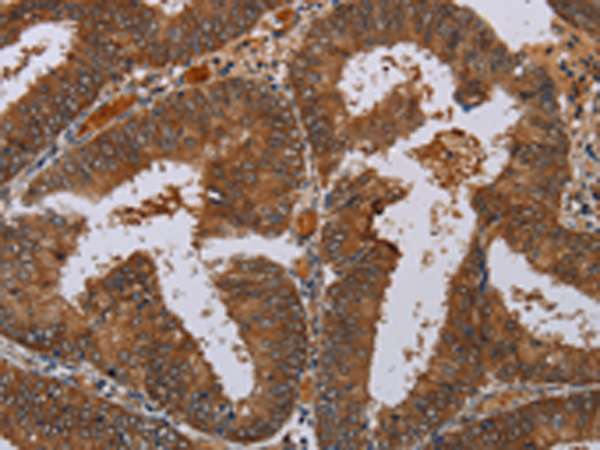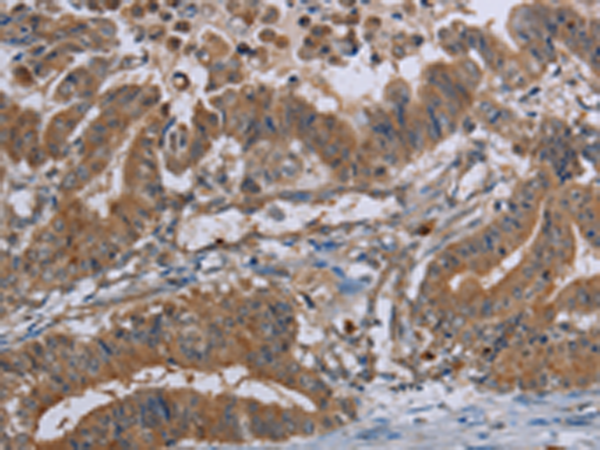

| WB | 咨询技术 | Human,Mouse,Rat |
| IF | 咨询技术 | Human,Mouse,Rat |
| IHC | 1/25-1/100 | Human,Mouse,Rat |
| ICC | 技术咨询 | Human,Mouse,Rat |
| FCM | 咨询技术 | Human,Mouse,Rat |
| Elisa | 1/1000-1/2000 | Human,Mouse,Rat |
| Aliases | LCMT; PPMT1; CGI-68 |
| Host/Isotype | Rabbit IgG |
| Antibody Type | Primary antibody |
| Storage | Store at 4°C short term. Aliquot and store at -20°C long term. Avoid freeze/thaw cycles. |
| Species Reactivity | Human, Rat |
| Immunogen | Fusion protein of human LCMT1 |
| Formulation | Purified antibody in PBS with 0.05% sodium azide and 50% glycerol. |
+ +
以下是关于LCMT1抗体的3篇参考文献及其摘要内容概要:
1. **文献名称**:*"LCMT1-dependent methylation regulates the association of PP2A and CK2α in cells"*
**作者**:Jiang X. et al.
**摘要**:研究利用LCMT1特异性抗体,通过免疫共沉淀技术揭示了LCMT1介导的PP2A甲基化如何调控其与CK2α激酶的相互作用,影响细胞周期调控和信号转导。
2. **文献名称**:*"Characterization of LCMT1 knockout mice reveals a critical role in neural development"*
**作者**:Lee J. et al.
**摘要**:通过Western blot和免疫组化实验(使用LCMT1抗体),发现LCMT1缺失导致小鼠胚胎神经发育异常,证明其在神经元分化和PP2A活性调控中的必要性。
3. **文献名称**:*"LCMT1 antibody validation for targeted proteomics in cancer models"*
**作者**:Smith R. et al.
**摘要**:该研究系统验证了LCMT1抗体的特异性,并应用于癌症细胞系样本分析,发现LCMT1表达水平与肿瘤侵袭性相关,提示其作为潜在生物标志物的价值。
---
以上文献均聚焦于LCMT1的功能机制或实验工具开发,摘要内容涵盖抗体在机制研究、疾病模型及技术验证中的应用。如需扩展,可补充针对特定疾病(如阿尔茨海默病)或甲基化酶活性研究的文献。
The LCMT1 (leucine carboxyl methyltransferase 1) antibody is a tool used to study the enzyme LCMT1. which plays a critical role in post-translational modification of protein phosphatase 2A (PP2A), a major serine/threonine phosphatase involved in cellular signaling. LCMT1 catalyzes the methylation of the PP2A catalytic subunit (PP2Ac) at its C-terminal leucine residue, a modification essential for the assembly and functional specificity of PP2A holoenzymes. These holoenzymes regulate diverse processes, including cell cycle progression, apoptosis, and metabolic pathways. Dysregulation of PP2A methylation, mediated by LCMT1. has been linked to cancers, neurodegenerative diseases, and developmental disorders.
Antibodies targeting LCMT1 are primarily used in research to investigate its expression, localization, and interaction partners in various biological contexts. They enable detection via techniques like Western blotting, immunofluorescence, and immunoprecipitation. Such studies help elucidate LCMT1's regulatory mechanisms, including its role in maintaining PP2A activity and its crosstalk with other methylation pathways. Commercially available LCMT1 antibodies are typically raised in rabbits or mice, with validation in knockout models or siRNA-treated cells to confirm specificity. Their application has advanced understanding of how LCMT1 dysfunction contributes to disease pathogenesis, particularly in cancer, where PP2A acts as a tumor suppressor. Ongoing research continues to explore LCMT1 as a potential therapeutic target.
×